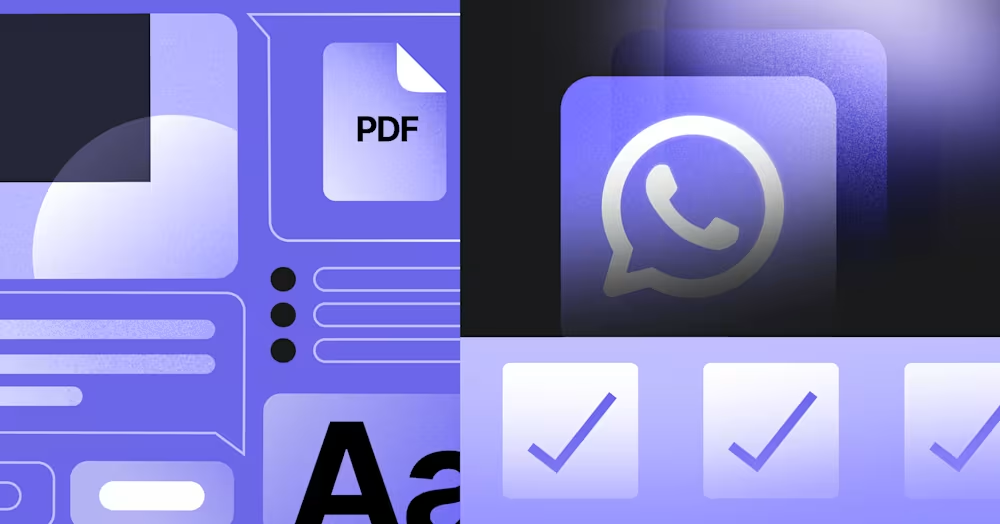
WhatsApp Message Template: A How-to Guide with 13 Examples
Businesses can't send WhatsApp messages after 24 hours unless they use WhatsApp Message Template. Learn how to format and send template messages plus examples.

How much does WhatsApp Business cost? When it comes to WhatsApp API pricing, this can be difficult to calculate. To avoid running into unnecessary expenses, businesses should be familiar with this topic. In this blog post, we will explain the current WhatsApp Business API pricing model, the additional costs you will face and the cheapest WhatsApp API partner for your business.
The WhatsApp Business App pricing model is simple - it’s free! But this is not the case for the WhatsApp Business Platform, also known as WhatsApp API. In this section, we’ll help you understand the cost of WhatsApp API for messaging.
To understand the costs associated with the WhatsApp API, you need to know how the API works. Firstly, businesses need to obtain WhatsApp API access. The cost of this access varies based on the hosting type: WhatsApp On-premises API or WhatsApp Cloud API.
The WhatsApp On-premises API is typically hosted on a Business Solution Provider’s (BSP) server. This means that BSPs have complete control over the charges they impose on businesses. These charges vary based on factors like WhatsApp API access fees, hosting type, message fees and more.
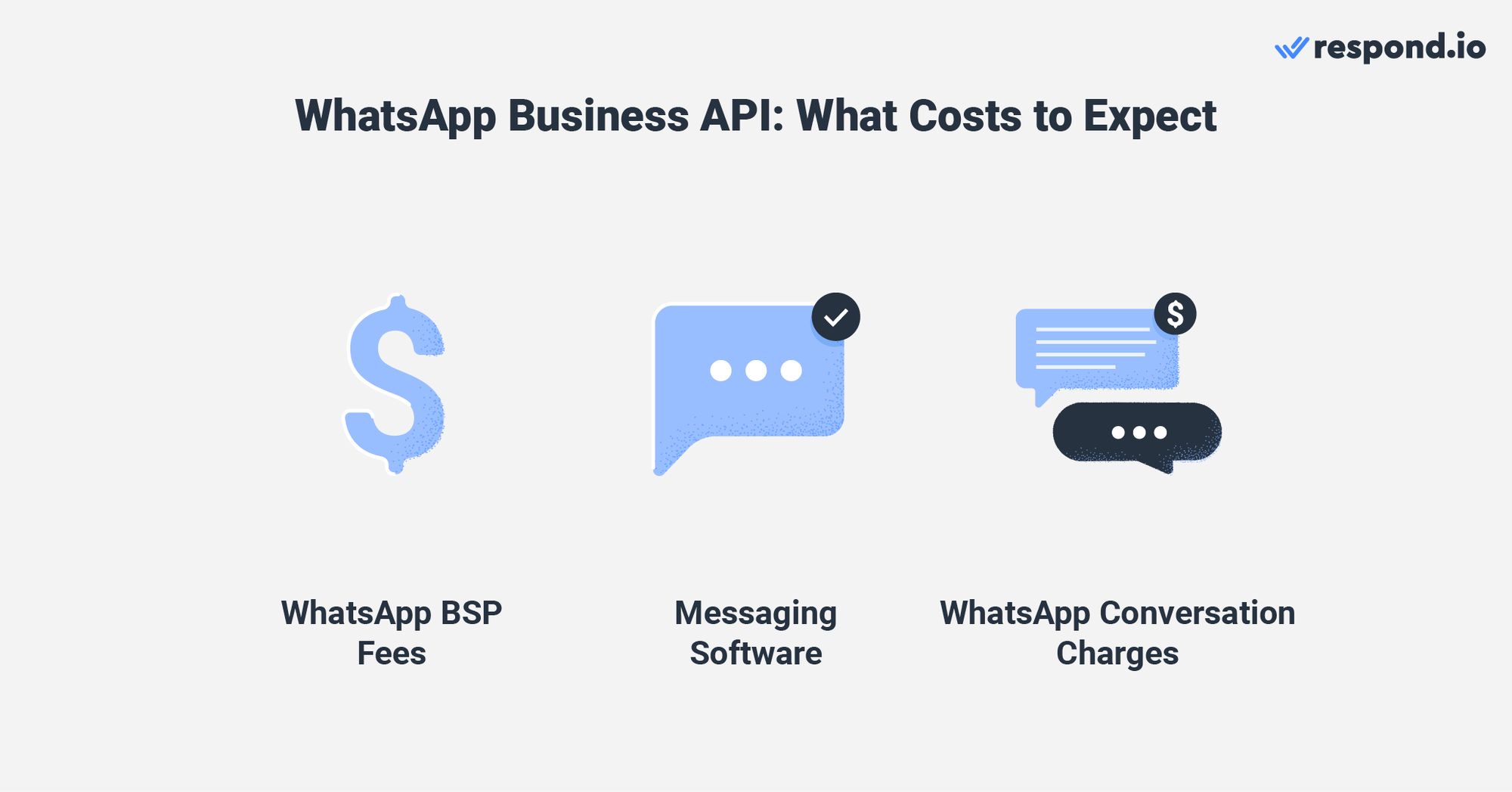
WhatsApp Cloud API, on the other hand, is hosted on Meta's cloud servers. Businesses can get WhatsApp Cloud API access through WhatsApp BSPs or directly from Meta. Because APIs do not have interfaces, businesses need to integrate them with a messaging software to send and receive messages.
To summarize, the WhatsApp Business API has three costs associated with it:
BSP fees
Messaging software costs
WhatsApp conversation charges
We’ll start by breaking down the WhatsApp conversation charges.
As of July 1, 2025, WhatsApp Business Platform has adopted a simpler, message-based pricing model that replaces the previous conversation-based system. While the 24-hour customer service window still plays an important role, the way businesses are charged has changed — and in many ways, it’s now more flexible and cost-efficient.
Here’s everything you need to know about the current WhatsApp pricing structure.
When a customer messages you first, this opens a 24-hour customer service window to reply freely without paying for every message — as long as you're using free-form text or utility message templates.
✅ Good news: Utility templates sent during this 24-hour window are completely free, but not marketing or authentication templates (more about this later). This makes it easier and cheaper to handle support and order updates without worrying about rising costs.
If you want to message a customer after the 24-hour window ends, you'll need to send a pre-approved template message. These are now charged per message, depending on the template category:
Utility – for things like receipts, order confirmations, and reminders
Authentication – for one-time passcodes or verification
Marketing – for promotions, announcements, and special offers
You’ll be billed for each template message delivered, so if you send one marketing template and one utility template, you’ll be charged twice.
📌 Templates can include text, media headers, personalized placeholders, Quick Reply buttons, and Call-to-Action buttons to encourage user interaction.
The type of template you use determines the charge. If you send multiple templates from different categories (e.g., one utility and one marketing message), you’ll be charged separately for each. However, sending multiple messages from the same category won’t incur extra charges for that category within the same conversation.
Templates with unclear content or mixed purposes will be classified as marketing — which is typically the most expensive category.
WhatsApp sets its rates based on the customer's phone number country code. That means pricing will vary depending on the user’s location, so be sure to check the latest country-specific pricing for accurate cost estimates.
Conversations are free when customers initiate them via click to WhatsApp ads or Facebook Page call-to-action buttons. Additionally, the 24-hour customer service window will be extended to 72 hours when customers message you through these free entry points.
During this messaging window, all messages sent are free, including WhatsApp template messages.
That’s not all. Each WhatsApp Business Account (WABA) receives 1,000 free service conversations every month. If you have more than one number linked to your WABA account, 1,000 free conversations will be shared between all your numbers.
With WhatsApp pricing made clear, it’s time to talk about the costs you will face from your BSP of choice.
Meta is yet to finalize the pricing for WhatsApp Business Calling API, but here’s what we know so far about the feature’s functionality and charges.
Charges are time-based and calculated per minute.
Rates vary by country based on the user’s country code.
WhatsApp Business API supports both inbound (user-initiated) and outbound (business-initiated) calls.
Inbound Calls: These are initiated by users to the business and are cost-free.
Outbound Calls: These require prior user permission and are billed based on usage.
Customer Service Window: A 24-hour customer service window is opened or refreshed when a user messages, calls, or accepts a call from your business, allowing for non-template messaging during this period.
Turn conversations into customers with respond.io's official WhatsApp API ✨
Manage WhatsApp calls and chats in one place!
As mentioned earlier, the charges BSPs impose are dependent on the hosting type among other factors. BSPs that offer WhatsApp On-premises API have to pay WhatsApp API fees to WhatsApp and bear server setup and maintenance costs. To gain profit, BSPs will pass these costs to end-users.
WhatsApp On-Premises API | WhatsApp Cloud API |
|---|---|
Setup charges | No server setup charges |
Hosting charges | No hosting charges |
WhatsApp conversation charges | WhatsApp conversation charges |
Some BSPs still charge per message sent in addition to conversation fees |
In contrast, BSPs that offer WhatsApp Cloud API impose little to no fees as Meta provides free WhatsApp API access and hosts WhatsApp on its servers. This eliminates any server-related expenses and results in lower costs for both BSPs and end-users.
Regardless of the type of WhatsApp Business API BSPs offer, a majority of them impose additional fees on top of the WhatsApp conversation charges like markups per message or setup fees. While costs differ from one BSP to another, we’ll cover some of the main BSPs in the market and their pricing models in the next section.
Some businesses need to operate multiple WhatsApp accounts—whether to support different branches worldwide, serve distinct teams, or work around the limitations of a single account. If that’s your case, keep in mind that some BSPs, like SleekFlow, charge extra for each connected WhatsApp number.
Specifically, SleekFlow charges US$15 per month per WhatsApp Business phone number.
Wati’s entry-level plan includes just three users, with no option to add more—an immediate limitation for businesses with growing support or sales teams. This low cap restricts your ability to scale on WhatsApp and will inevitably push you toward a more expensive plan very quickly.
Many BSPs impose markups on messages that you send and deliver on WhatsApp and MessageBird is one of them. It offers WhatsApp API access while adding its own message fees on top of the WhatsApp conversation charges.
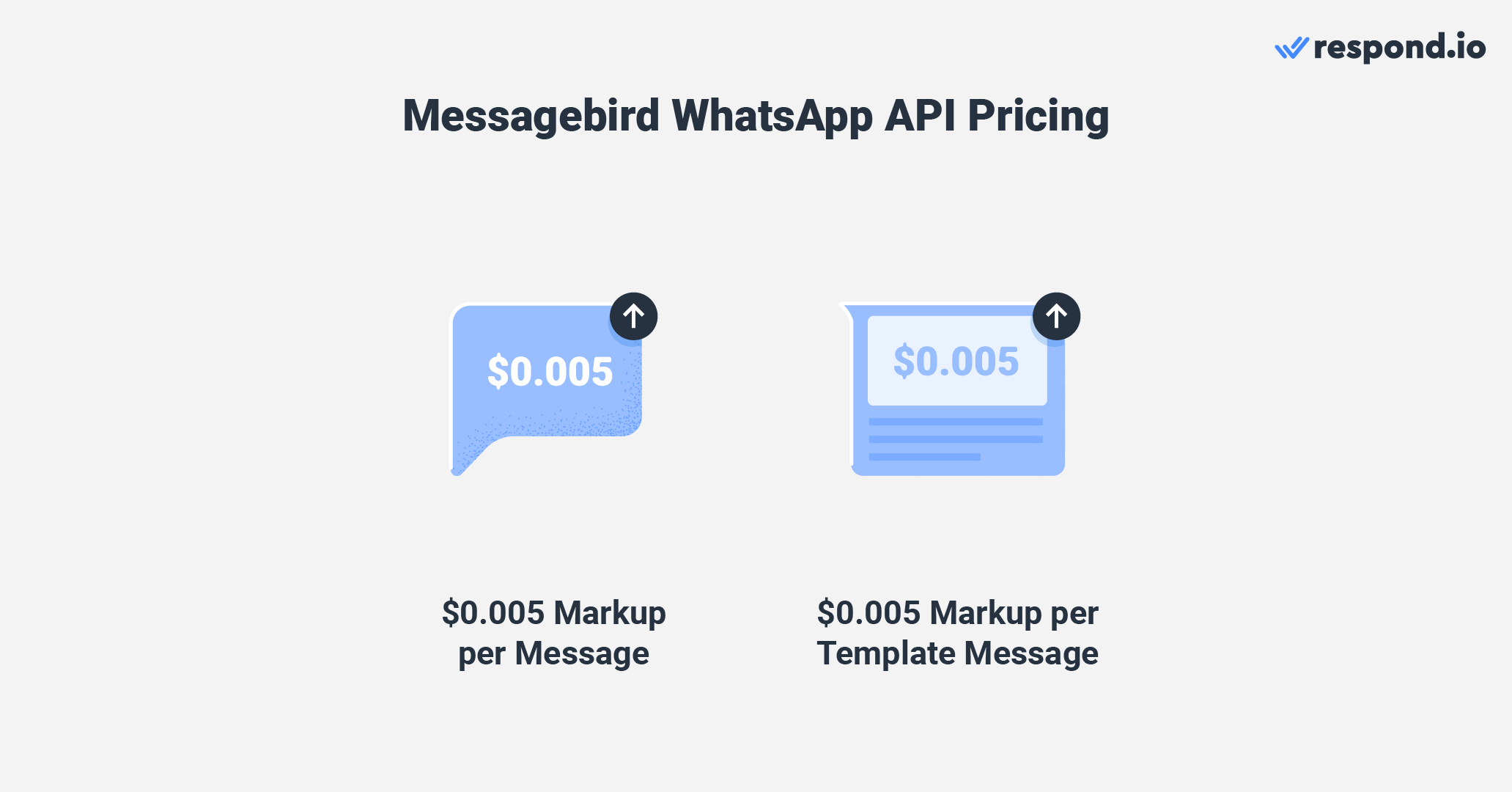
While WhatsApp conversation charges vary by country, MessageBird adds a $0.005 markup per session message sent by the business. There is also a $0.005 markup per template message, on top of the WhatsApp charges.
Twilio kept the per-message pricing model after the WhatsApp Business pricing changes. In their own words, “Pay-as-you-go pricing makes sure you only pay for what you use”.
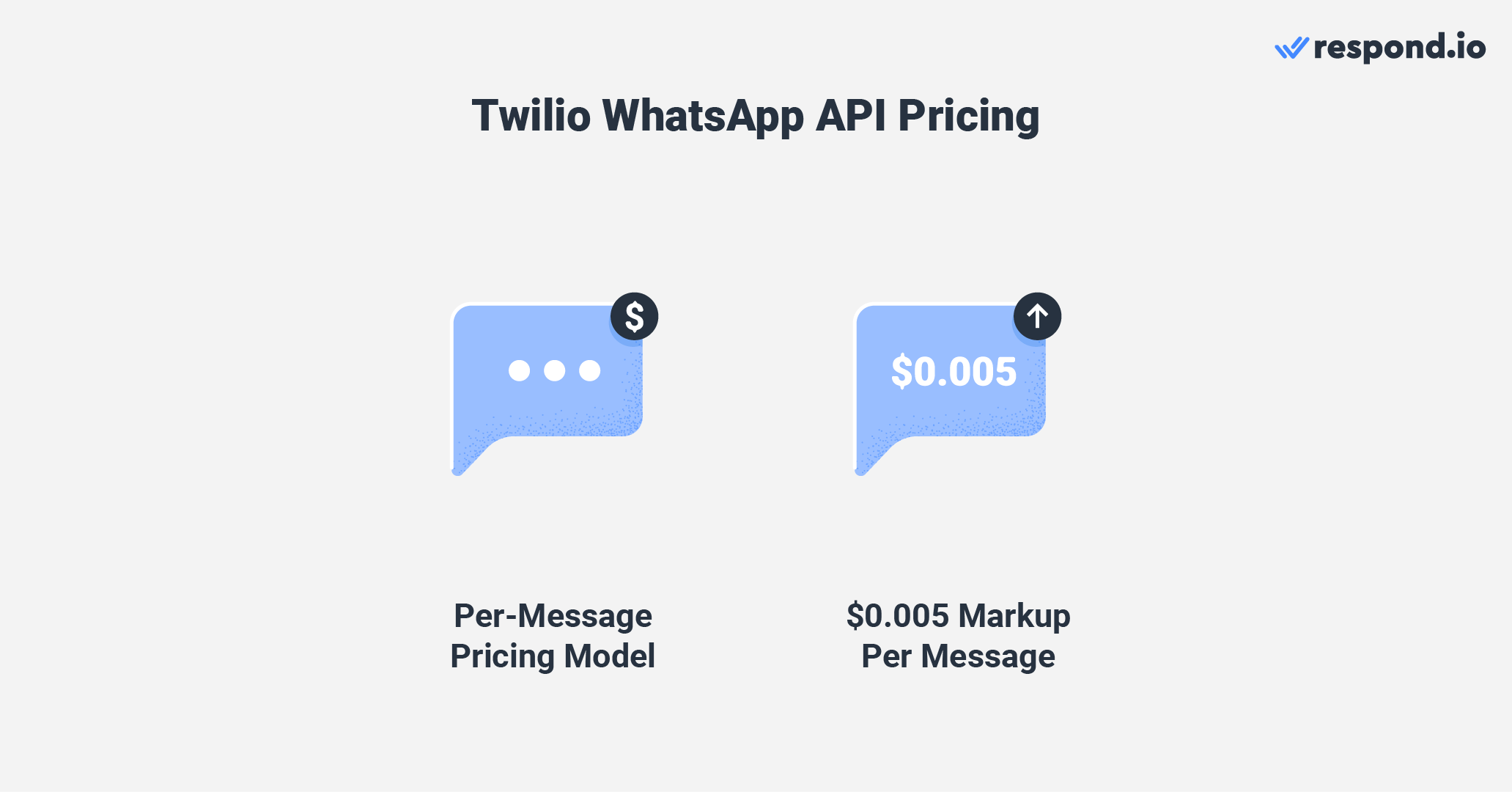
On top of WhatsApp conversation charges, Twilio charges a $0.005 flat fee per message sent and also per message received. This markup applies to both business-initiated conversations and service conversations.
360dialog offers three monthly plans for WhatsApp API access that range from $53 to $218. Businesses must also pay a hosting fee, which starts at $20 per month. However, it doesn’t add any markup fee on messages sent or received.
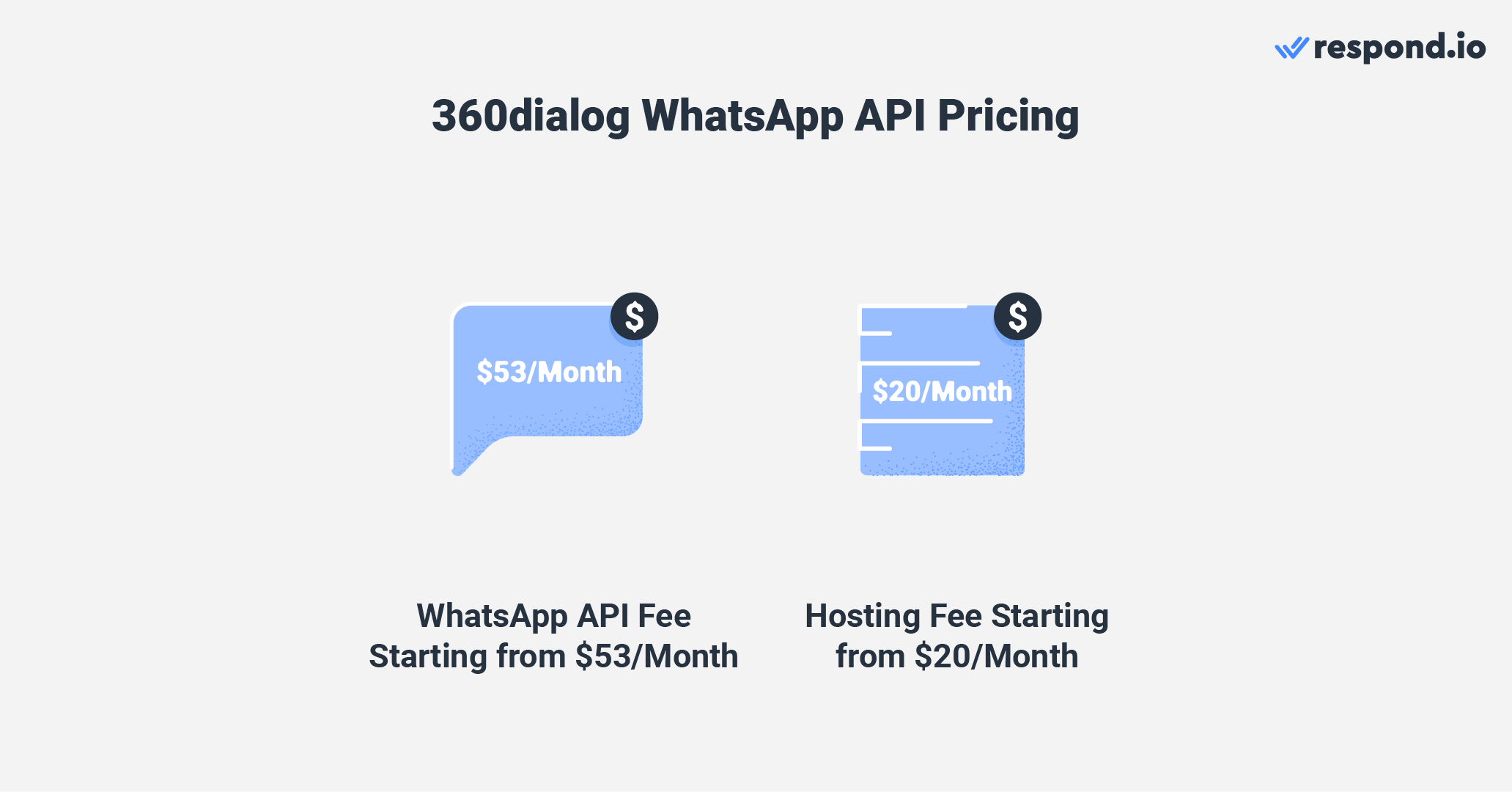
Since it only provides API access, you'll need to integrate your WhatsApp API with a messaging software like respond.io to actually send and receive messages. As a result, you’ll have to spend up to $73 per month just for WhatsApp API access.
Respond.io is a recognized WhatsApp Business Solution Provider (BSP) and customer conversation management software. It allows you to get free WhatsApp API access, manage your WhatsApp Business Account and receive messages in an omnichannel inbox.
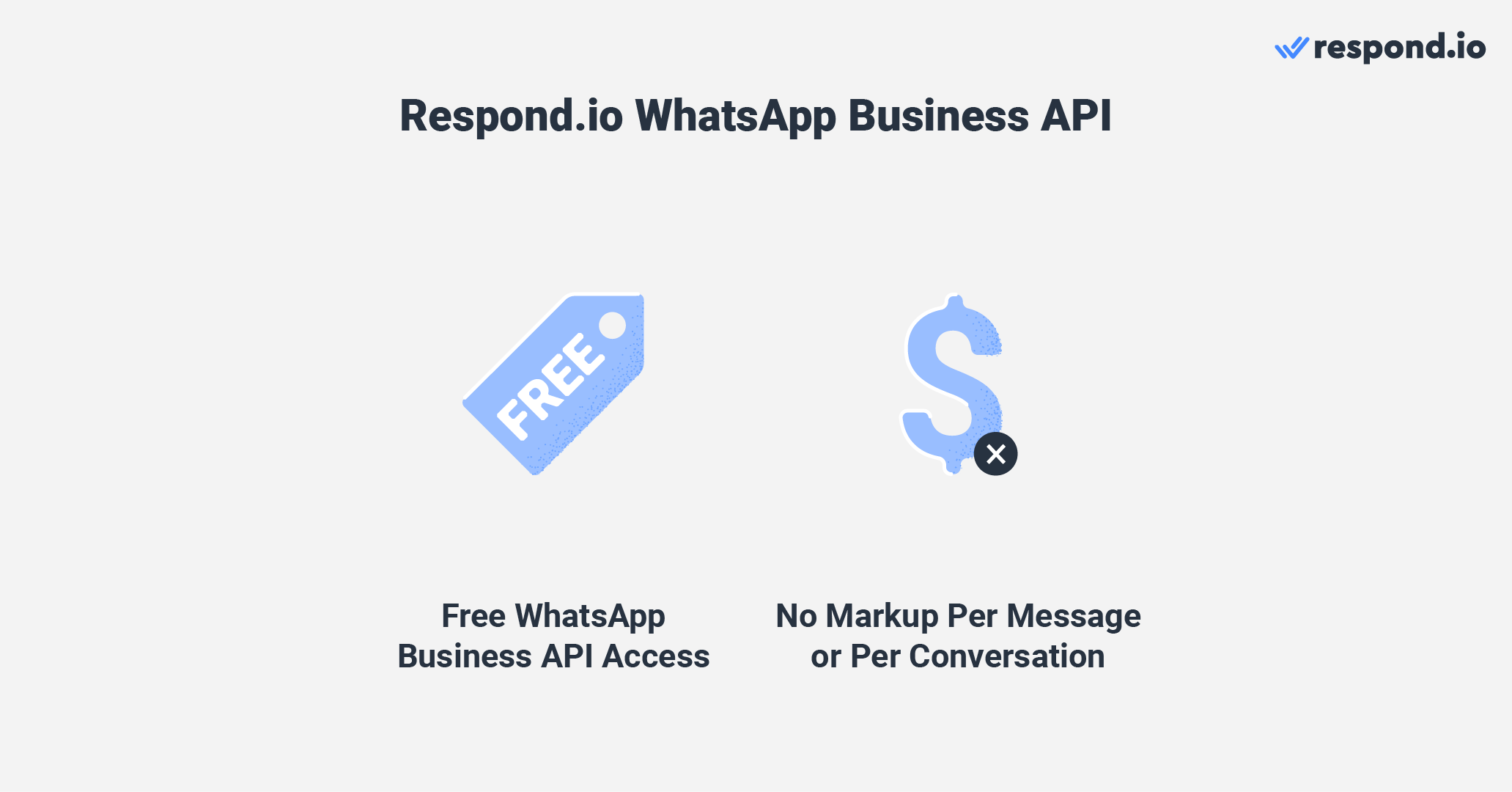
Because respond.io offers WhatsApp Cloud API, businesses only need to pay WhatsApp conversation charges that are made compulsory by WhatsApp. It does not impose any setup, per conversation fee or per message fees.
If you’re looking for a BSP that is also a messaging software provider, respond.io is your best bet. Now that you understand the pricing plans offered by popular WhatsApp BSPs, we’ll look at the most common business use cases and how the current WhatsApp Business pricing model affects them.
Companies often have different teams messaging customers via WhatsApp API and these teams have different messaging habits.
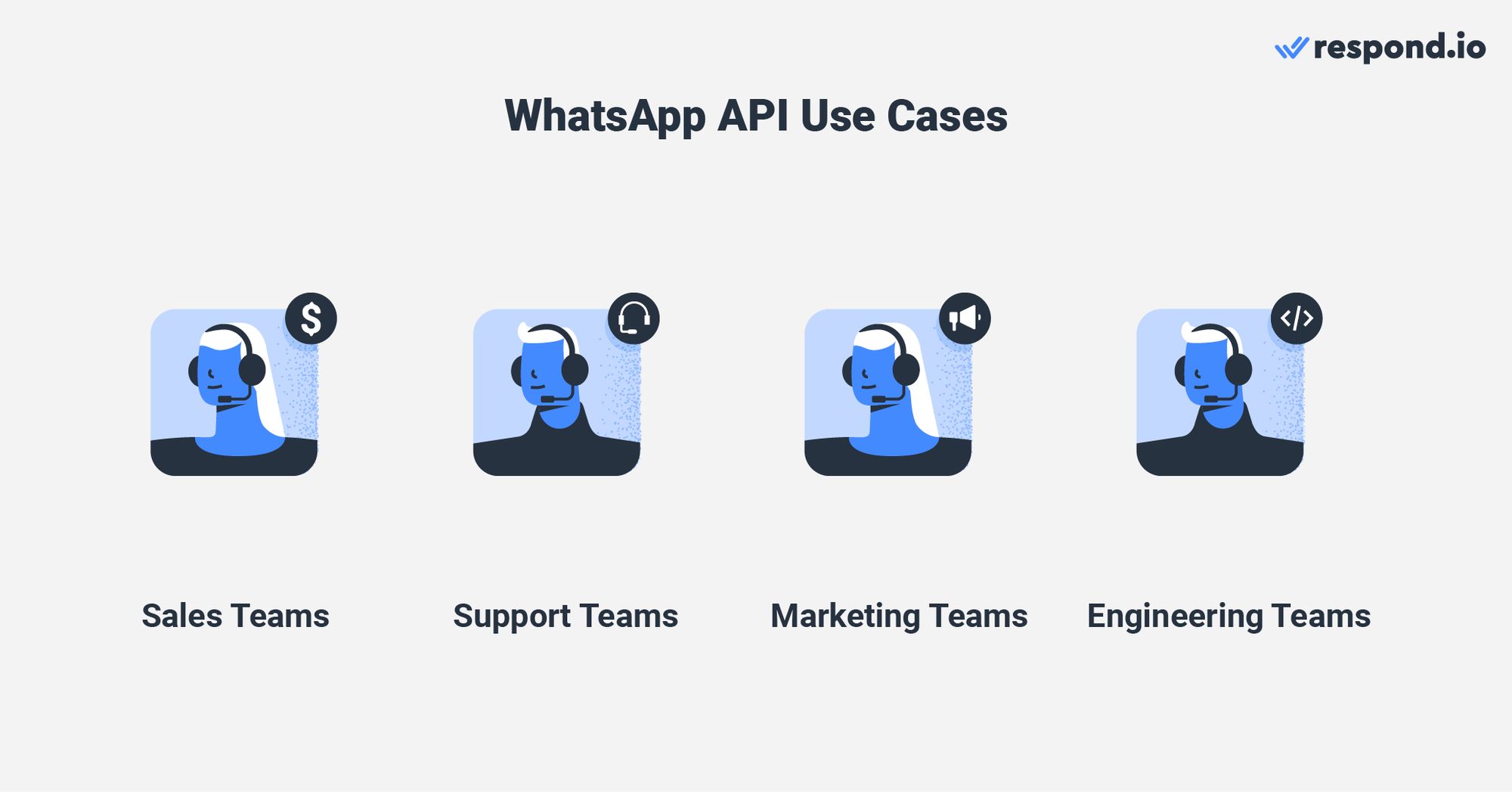
In this section, we’ll discuss what costs to expect when using WhatsApp API for sales, support, marketing and engineering.
Sales Teams typically initiate conversations with leads, incurring higher costs for business-initiated conversations. For sales teams with low sales volume but high profit margins per sale, choosing a MAC or monthly plan can be cost-effective, as they often engage in fewer but more profitable conversations.
Support Teams primarily respond to inbound inquiries, benefiting from service conversation pricing. WhatsApp only charges for one message in a service conversation if it's replied to within 24 hours, making it more cost-effective for support teams.
However, extra charges apply for conversations extending beyond this window, and support teams must take care to avoid unnecessary charges for spam or irrelevant messages.
For teams interested in WhatsApp marketing to send promotional messages, each counts as a business-initiated conversation. This can be costly, especially if you send WhatsApp bulk messages, so it's advisable to select a BSP that doesn't charge a markup fee per message. It's important to adhere to WhatsApp's Business Policy to avoid misuse for spam.
Also consider integrating a WhatsApp CRM to further enhance your sales and marketing operations with WhatsApp.
Operational technical implementors (engineering teams) send transactional notifications like payment confirmations or password resets, categorized as business-initiated conversations. Choosing BSPs without additional message costs is recommended to minimize expenses.
In general, transactional notifications are business-initiated conversations, as they are not sent in response to a customer’s message. Business-initiated conversations are more expensive, so BSPs with additional message costs should be avoided.
Now that you understand everything you need about WhatsApp API pricing and the costs associated with it, it’s time to choose the right BSP for your business needs.
As a business, paying conversation charges to WhatsApp to chat with customers is inevitable. However, you can avoid additional fees imposed by some WhatsApp BSPs. Unlike other providers, respond.io does not charge any setup fees, hosting fees or markup per message or conversation.
As you may expect, respond.io supports key WhatsApp API features like sending broadcasts to large audiences and setting up interactive messages. However, you’ll also experience plenty of advanced features like AI Agent, a customizable chatbot that learns and improves its responses through training.
Plus, as a recognized Meta Business Partner, respond.io has undergone Meta's assessment for its proficiency in Meta products such as WhatsApp, Facebook Messenger, and Instagram DM. This affiliation comes with several advantages, including enhanced support from Meta, contributing to an elevated level of service for respond.io users.
If you're looking for a WhatsApp BSP that also offers AI-powered conversation management software, sign up for respond.io and get free WhatsApp API access.
Turn conversations into customers with respond.io's official WhatsApp API ✨
Manage WhatsApp calls and chats in one place!
No. Using WhatsApp Business API involves the following costs:
Messaging software costs
WhatsApp conversation charges
Business Solution Provider fees
Applying for WhatsApp Cloud API doesn’t cost money. This is important to know, as some BSPs could charge you an unnecessary fee for the application process. However, you’ll still need to pay the WhatsApp conversation charges and messaging software costs to message customers.
We recommend using a cloud-hosted WhatsApp API solution, as it tends to be cheaper. With a respond.io plan, you can get both WhatsApp API and the leading AI-powered customer conversation management software. It’s great value for your money!
WhatsApp charges fees based on conversation-based pricing. Fees apply when a business initiates a conversation with a customer or responds to a customer's message beyond a 24-hour window. The first 1,000 conversations each month are free.
That’s all you need to know about the WhatsApp API cost for businesses. If found this reading interesting, check out the following articles:
Román Filgueira, a University of Vigo graduate holding a Bachelor's in Foreign Languages, joined the respond.io team as a Content Writer in 2021. Román offers expert insights on best practices for using messaging apps to drive business growth.

Businesses can't send WhatsApp messages after 24 hours unless they use WhatsApp Message Template. Learn how to format and send template messages plus examples.